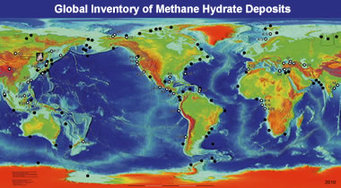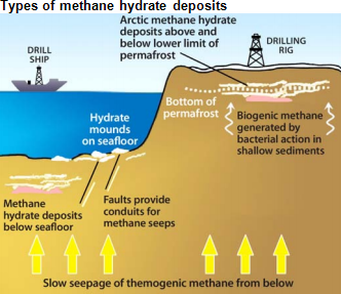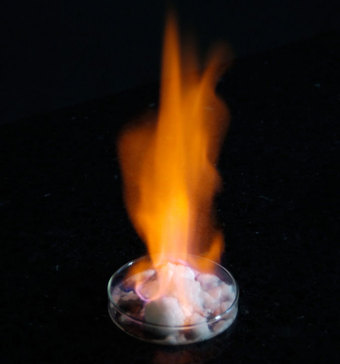|
“Methane hydrates- bigger than shale gas, ‘game over’ for the environment?”
Melissa C. Lott March 19th, 2013 http://blogs.scientificamerican.com/plugged-in/2013/03/19/methane-hydrates-bigger-than-shale-gas-game-over-for-the-environment/ Methane hydrate deposits could hold up to 15 times the amount of gas as the world’s shale deposits. At the same time, they represent more carbon than all of the world’s fossil fuels combined. So, it’s no wonder that the response to recent announcements by the Japanese has been a bit mixed.
Methane hydrates (a.k.a. methane clathrates or fire ice) are solid compounds where methane is literally trapped in water. The substance looks like ice and can be found deep on the ocean floor, locked under layers of sediments. Last Tuesday, Japan announced that researchers have successfully produced natural gas from offshore methane hydrates in the the Eastern Nankai Trough. In the words of energy analyst Jesse Jenkins, this success could have explosive implications. In his article, posted Friday on The Energy Collective, Jenkins explains his views on the impact of unlocking this resource, stating that: “Of course, just as with shale gas, not all of this potential energy resource will prove technically recoverable. Yet if (or should we say when?) technology to commercially extract gas from hydrates is developed, the implications for global energy markets are staggering nonetheless.” Below if a portion of his piece, which was originally published on Friday on The Energy Collective. In it, Jenkins presents the big economic and environmental considerations that have come to the forefront of the methane hydrates discussion. “Hydrates could remake energy markets Methane hydrates are the world’s largest source of untapped fossil energy. And they are widely distributed across the world, as indicated in the graphic from the US Geological Survey (USGS) below……Japan is currently the world’s largest importer of liquefied natural gas and faces gas prices roughly four-times higher than those enjoyed in the United States. The development of hydrates could potentially erase that price differential. “Depending on where the final cost of capturing methane hydrates ultimately rests, this can mean large reductions in natural gas prices throughout the world,” explains [Christopher] Knittel, [MIT energy Professor of energy economics]. In short, methane hydrates could once again reshape global gas markets, just as the development of shale gas has done in the last decade. “Game over” for the climate? While hydrate resources look like an enormous boon to energy-starved nations like Japan, all that carbon and methane has climate scientists and advocates concerned. Developing methane hydrates would be “game over for the climate,” writes green blogger Mat McDermott. It’s easy to see why he’d be concerned: methane hydrates contain more carbon than all the world’s other fossil resources combined, according to USGS estimates. If developed at a significant scale, hydrates would certainly be more than enough to cook the climate. Depending on how cost-effective production of gas hydrates proves, this vast new fossil energy resource could lower energy prices worldwide. “These lower prices almost certainly will lead to an increase in fossil-fuel consumption on an energy basis,” says Knittel. “That’s the bad news, from a climate perspective.” But in principle, clean-burning natural gas from hydrates could also help displace coal consumption in places like China and India, just as cheap shale gas is now driving coal out of U.S. electricity markets. That scenario could potentially yield climate benefits and cleaner air — assuming the displaced coal stays in the ground and hydrates aren’t used to simply prolong reliance on fossil fuels. To preserve any climate benefits of this hypothetical coal-to-gas shift, hydrate drillers would also have to be wary of letting methane leak out of hydrate deposits and into the atmosphere. Methane is an extremely potent greenhouse gas, and even modest leakage rates could nix any potential climate benefit of burning gas from hydrates instead of coal…” Methane hydrates represent a huge potential energy resource, with correspondingly significant economic and environmental impact potential. How to best manage the balance between the two is an open question that it appears that society will be facing sooner rather than later. I chose this article because it can have a large impact on our future energy usage.
-Methane hydrates- Methane hydrates are solid compounds that contain methane that is tapped in water. -Natural gas- Natural gas is a hydrocarbon gas mixture that is used as an energy source. -Shale gas- Shale gas is a type of natural gas that is found in shale formations (a type of sedimentary rock). This article discusses a form of natural gas called methane hydrates. Methane hydrates can hold vast amounts of gas but also have more carbon than all other fossil fuels combined. Japan is pushing the use of methane hydrates because they have gas prices that are almost four-times the prices in the U.S. and are looking to close that gap. The article details the environmental effects and claims that the lower prices that would result from the use of methane hydrates would drive the cost of fossil fuels down. As the prices fall, consumption will increase and further contribute to human greenhouse gas emissions. In addition, methane can leak out of the deposits contributing even more to greenhouse gas emissions. This potential energy source may have disastrous effects on the environment. Not only will they have a direct impact, but also the use of methane hydrates will drive the cost of fossil fuels down and further encourage the consumption of these fossil fuels. The Japanese along with the rest of the world should explore alternative energy sources to reduce human greenhouse emissions. |




